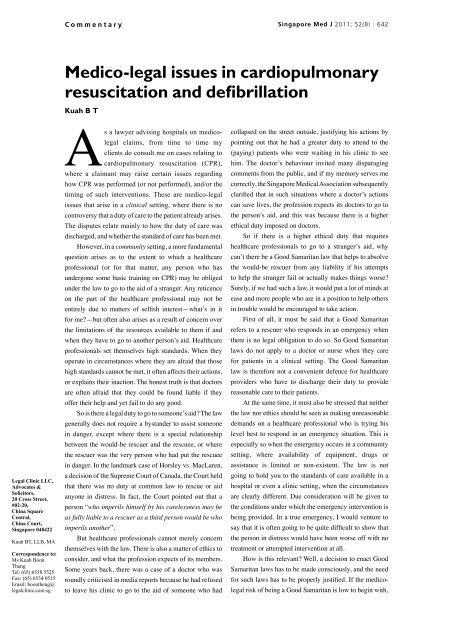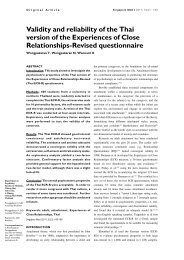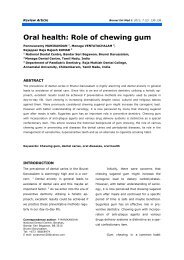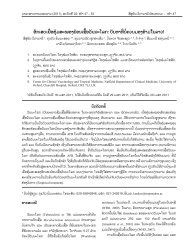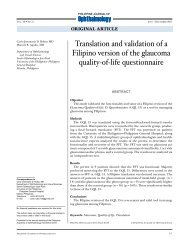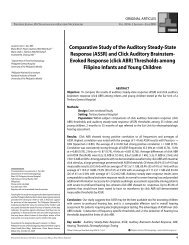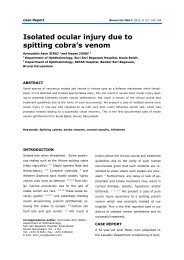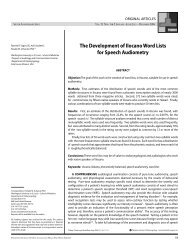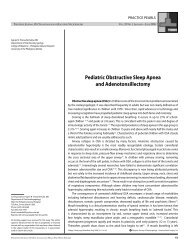Medico-legal issues in cardiopulmonary ... - APAMED Central
Medico-legal issues in cardiopulmonary ... - APAMED Central
Medico-legal issues in cardiopulmonary ... - APAMED Central
Create successful ePaper yourself
Turn your PDF publications into a flip-book with our unique Google optimized e-Paper software.
Legal Cl<strong>in</strong>ic LLC,<br />
Advocates &<br />
Solicitors,<br />
20 Cross Street,<br />
#02-20,<br />
Ch<strong>in</strong>a Square<br />
<strong>Central</strong>,<br />
Ch<strong>in</strong>a Court,<br />
S<strong>in</strong>gapore 048422<br />
Kuah BT, LLB, MA<br />
Correspondence to:<br />
Ms Kuah Boon<br />
Theng<br />
Tel: (65) 6538 5525<br />
Fax: (65) 6534 0515<br />
Email: boontheng@<br />
<strong>legal</strong>cl<strong>in</strong>ic.com.sg<br />
Commentary<br />
S<strong>in</strong>gapore Med J 2011; 52(8) : 642<br />
<strong>Medico</strong>-<strong>legal</strong> <strong>issues</strong> <strong>in</strong> <strong>cardiopulmonary</strong><br />
resuscitation and defibrillation<br />
Kuah B T<br />
As a lawyer advis<strong>in</strong>g hospitals on medico<strong>legal</strong><br />
claims, from time to time my<br />
clients do consult me on cases relat<strong>in</strong>g to<br />
<strong>cardiopulmonary</strong> resuscitation (CPR),<br />
where a claimant may raise certa<strong>in</strong> <strong>issues</strong> regard<strong>in</strong>g<br />
how CPR was performed (or not performed), and/or the<br />
tim<strong>in</strong>g of such <strong>in</strong>terventions. These are medico-<strong>legal</strong><br />
<strong>issues</strong> that arise <strong>in</strong> a cl<strong>in</strong>ical sett<strong>in</strong>g, where there is no<br />
controversy that a duty of care to the patient already arises.<br />
The disputes relate ma<strong>in</strong>ly to how the duty of care was<br />
discharged, and whether the standard of care has been met.<br />
However, <strong>in</strong> a community sett<strong>in</strong>g, a more fundamental<br />
question arises as to the extent to which a healthcare<br />
professional (or for that matter, any person who has<br />
undergone some basic tra<strong>in</strong><strong>in</strong>g on CPR) may be obliged<br />
under the law to go to the aid of a stranger. Any reticence<br />
on the part of the healthcare professional may not be<br />
entirely due to matters of selfish <strong>in</strong>terest—what’s <strong>in</strong> it<br />
for me?—but often also arises as a result of concern over<br />
the limitations of the resources available to them if and<br />
when they have to go to another person’s aid. Healthcare<br />
professionals set themselves high standards. When they<br />
operate <strong>in</strong> circumstances where they are afraid that those<br />
high standards cannot be met, it often affects their actions,<br />
or expla<strong>in</strong>s their <strong>in</strong>action. The honest truth is that doctors<br />
are often afraid that they could be found liable if they<br />
offer their help and yet fail to do any good.<br />
So is there a <strong>legal</strong> duty to go to someone’s aid? The law<br />
generally does not require a bystander to assist someone<br />
<strong>in</strong> danger, except where there is a special relationship<br />
between the would-be rescuer and the rescuee, or where<br />
the rescuer was the very person who had put the rescuee<br />
<strong>in</strong> danger. In the landmark case of Horsley vs. MacLaren,<br />
a decision of the Supreme Court of Canada, the Court held<br />
that there was no duty at common law to rescue or aid<br />
anyone <strong>in</strong> distress. In fact, the Court po<strong>in</strong>ted out that a<br />
person “who imperils himself by his carelessness may be<br />
as fully liable to a rescuer as a third person would be who<br />
imperils another”.<br />
But healthcare professionals cannot merely concern<br />
themselves with the law. There is also a matter of ethics to<br />
consider, and what the profession expects of its members.<br />
Some years back, there was a case of a doctor who was<br />
roundly criticised <strong>in</strong> media reports because he had refused<br />
to leave his cl<strong>in</strong>ic to go to the aid of someone who had<br />
collapsed on the street outside, justify<strong>in</strong>g his actions by<br />
po<strong>in</strong>t<strong>in</strong>g out that he had a greater duty to attend to the<br />
(pay<strong>in</strong>g) patients who were wait<strong>in</strong>g <strong>in</strong> his cl<strong>in</strong>ic to see<br />
him. The doctor’s behaviour <strong>in</strong>vited many disparag<strong>in</strong>g<br />
comments from the public, and if my memory serves me<br />
correctly, the S<strong>in</strong>gapore Medical Association subsequently<br />
clarified that <strong>in</strong> such situations where a doctor’s actions<br />
can save lives, the profession expects its doctors to go to<br />
the person’s aid, and this was because there is a higher<br />
ethical duty imposed on doctors.<br />
So if there is a higher ethical duty that requires<br />
healthcare professionals to go to a stranger’s aid, why<br />
can’t there be a Good Samaritan law that helps to absolve<br />
the would-be rescuer from any liability if his attempts<br />
to help the stranger fail or actually makes th<strong>in</strong>gs worse?<br />
Surely, if we had such a law, it would put a lot of m<strong>in</strong>ds at<br />
ease and more people who are <strong>in</strong> a position to help others<br />
<strong>in</strong> trouble would be encouraged to take action.<br />
First of all, it must be said that a Good Samaritan<br />
refers to a rescuer who responds <strong>in</strong> an emergency when<br />
there is no <strong>legal</strong> obligation to do so. So Good Samaritan<br />
laws do not apply to a doctor or nurse when they care<br />
for patients <strong>in</strong> a cl<strong>in</strong>ical sett<strong>in</strong>g. The Good Samaritan<br />
law is therefore not a convenient defence for healthcare<br />
providers who have to discharge their duty to provide<br />
reasonable care to their patients.<br />
At the same time, it must also be stressed that neither<br />
the law nor ethics should be seen as mak<strong>in</strong>g unreasonable<br />
demands on a healthcare professional who is try<strong>in</strong>g his<br />
level best to respond <strong>in</strong> an emergency situation. This is<br />
especially so when the emergency occurs <strong>in</strong> a community<br />
sett<strong>in</strong>g, where availability of equipment, drugs or<br />
assistance is limited or non-existent. The law is not<br />
go<strong>in</strong>g to hold you to the standards of care available <strong>in</strong> a<br />
hospital or even a cl<strong>in</strong>ic sett<strong>in</strong>g, when the circumstances<br />
are clearly different. Due consideration will be given to<br />
the conditions under which the emergency <strong>in</strong>tervention is<br />
be<strong>in</strong>g provided. In a true emergency, I would venture to<br />
say that it is often go<strong>in</strong>g to be quite difficult to show that<br />
the person <strong>in</strong> distress would have been worse off with no<br />
treatment or attempted <strong>in</strong>tervention at all.<br />
How is this relevant? Well, a decision to enact Good<br />
Samaritan laws has to be made consciously, and the need<br />
for such laws has to be properly justified. If the medico<strong>legal</strong><br />
risk of be<strong>in</strong>g a Good Samaritan is low to beg<strong>in</strong> with,
the need for Good Samaritan laws would not be seen as a<br />
priority for lawmakers.<br />
In reality, a Good Samaritan does assume risks, and<br />
enact<strong>in</strong>g Good Samaritan laws does not automatically<br />
mean that those risks are removed. The law does not<br />
require a bystander to render assistance <strong>in</strong> an emergency<br />
situation, but if a Good Samaritan does choose to<br />
respond, he is actually under a duty of care to act<br />
reasonably. If the rescue actions are unreasonable or<br />
actually aggravate the plight of the victim, the rescuer<br />
can potentially become liable to the victim.<br />
That actually makes good sense to a lot of people.<br />
We would not want the existence of Good Samaritan<br />
laws to encourage rash behaviour that could put the<br />
victim <strong>in</strong> greater danger, especially when the victim is<br />
at his most vulnerable and unable to resist the Good<br />
Samaritan’s attempts at rescue, no matter how foolish<br />
and <strong>in</strong>appropriate.<br />
Let’s look at the case of Van Horn vs. Torti, a decision<br />
of the California Supreme Court. In that case, Lisa<br />
Torti and her co-worker Alexandra Van Horn had been<br />
<strong>in</strong>volved <strong>in</strong> a car crash. Torti saw smoke and believed<br />
that the car was about to explode. She yanked her <strong>in</strong>jured<br />
and helpless friend out of the wreck “like a rag doll”,<br />
and it turned out that her action likely caused her friend<br />
to become a paraplegic. The car did not explode, and her<br />
friend subsequently sued her for negligence.<br />
Now, California had enacted Good Samaritan<br />
laws. The California Health and Safety Code 1799.102<br />
provided that “no person who <strong>in</strong> good faith, and not<br />
for compensation, renders emergency care at the scene<br />
of an emergency shall be liable for any civil damages<br />
result<strong>in</strong>g from any act or omission”. So naturally, Torti<br />
raised this as her defence. However, <strong>in</strong> a 4–3 rul<strong>in</strong>g, the<br />
Court held that the statute immunis<strong>in</strong>g rescuers from<br />
liability applied only if the <strong>in</strong>dividual was provid<strong>in</strong>g<br />
medical care <strong>in</strong> an emergency situation. S<strong>in</strong>ce Torti was<br />
act<strong>in</strong>g only as a concerned friend, the majority held that<br />
she did not benefit from the protection under this law.<br />
The Court said: “A person has no duty to come to the<br />
aid of another. If, however, a person elects to come to<br />
someone’s aid, he or she has a duty to exercise due care.<br />
Thus, a ‘Good Samaritan’ who attempts to help someone<br />
might be liable if he or she does not exercise due care<br />
and ends up caus<strong>in</strong>g harm.”<br />
In the US, this decision attracted some criticism.<br />
Some po<strong>in</strong>ted out that such a narrow <strong>in</strong>terpretation of<br />
Good Samaritan laws had the effect of discourag<strong>in</strong>g<br />
future Good Samaritans out of a fear of be<strong>in</strong>g sued. A<br />
Republican state senator who had been a highway patrol<br />
officer for many years po<strong>in</strong>ted out that <strong>in</strong> his previous<br />
S<strong>in</strong>gapore Med J 2011; 52(8) : 643<br />
work when he responded to an accident, he was often<br />
not the first on the scene and a bystander might have<br />
helped a victim out of a car and was <strong>in</strong> the process of<br />
adm<strong>in</strong>ister<strong>in</strong>g CPR. He felt that the decision <strong>in</strong> Van<br />
Horn vs. Torti would thwart people’s will<strong>in</strong>gness to go<br />
to someone else’s aid and that this could translate to loss<br />
of lives. Yet others, <strong>in</strong>clud<strong>in</strong>g <strong>legal</strong> scholars, po<strong>in</strong>ted<br />
out that it made good sense that those who want to<br />
be rescuers must cont<strong>in</strong>ue to be held to a standard of<br />
reasonable care. A noble <strong>in</strong>tention to help others was no<br />
excuse for recklessness or negligence that could cause<br />
even more <strong>in</strong>jury.<br />
So what are the implications to healthcare<br />
professionals who recognise that their tra<strong>in</strong><strong>in</strong>g puts<br />
them <strong>in</strong> a position to help others requir<strong>in</strong>g emergency<br />
treatment, and who genu<strong>in</strong>ely want to fulfill their<br />
moral and ethical duty to respond appropriately <strong>in</strong> such<br />
situations? Well, my advice is, don’t wait for Good<br />
Samaritan laws to be enacted. Yes, the existence of Good<br />
Samaritan laws may provide doctors with more comfort<br />
and assurance when they have to go to someone’s aid,<br />
but so long as you exercise good sense, it is go<strong>in</strong>g to be<br />
very hard for you to be blamed or successfully found to<br />
be liable when that person you are try<strong>in</strong>g to rescue does<br />
not survive or suffers further <strong>in</strong>jury. The claimant has to<br />
prove that the bad outcome was caused by your attempt,<br />
and not by the orig<strong>in</strong>al acute condition or <strong>in</strong>jury.<br />
It is also important to rem<strong>in</strong>d doctors not to forget the<br />
tra<strong>in</strong><strong>in</strong>g they have received <strong>in</strong> perform<strong>in</strong>g CPR and us<strong>in</strong>g<br />
defribillators. Many doctors may have received tra<strong>in</strong><strong>in</strong>g<br />
early <strong>in</strong> their careers, but have had very little occasion to<br />
use their skills <strong>in</strong> their current practice. Keep<strong>in</strong>g updated<br />
and learn<strong>in</strong>g how to operate new equipment that could<br />
<strong>in</strong>creas<strong>in</strong>gly be found outside a hospital or cl<strong>in</strong>ic sett<strong>in</strong>g<br />
could make all the difference to whether your <strong>in</strong>tervention<br />
saves a life. A doctor respond<strong>in</strong>g <strong>in</strong> an emergency would<br />
still be expected to assess appropriately and to make<br />
sensible and logical decisions on what to do. While he<br />
will be judged with full consideration of the limitations<br />
placed on him, extenuat<strong>in</strong>g circumstances alone will not<br />
excuse actions that recklessly endanger others.<br />
So the key to manag<strong>in</strong>g medico-<strong>legal</strong> risks associated<br />
with perform<strong>in</strong>g CPR and us<strong>in</strong>g defribrillation lies not<br />
so much <strong>in</strong> provid<strong>in</strong>g special <strong>legal</strong> defences, but <strong>in</strong> the<br />
simple application of good sense and proper tra<strong>in</strong><strong>in</strong>g,<br />
and the regular upgrad<strong>in</strong>g of one’s knowledge and skills;<br />
all the th<strong>in</strong>gs that medical professionals are supposed to<br />
be do<strong>in</strong>g anyway. So when someone shouts, “Is there<br />
a doctor <strong>in</strong> the house?”, let’s hope that doctors will be<br />
able to respond confidently and without undue fear and<br />
trepidation.


